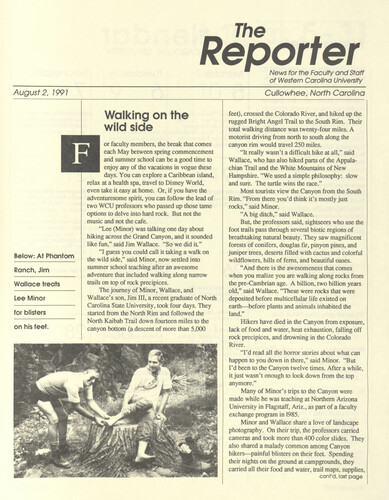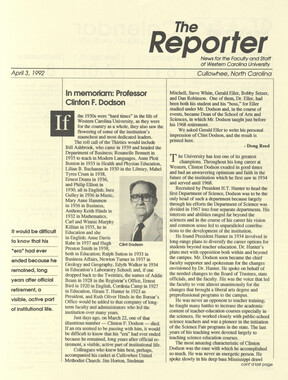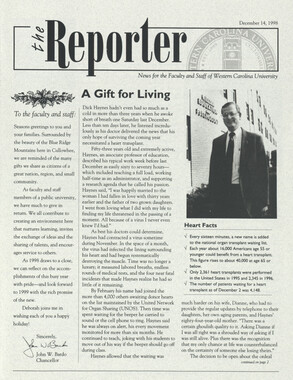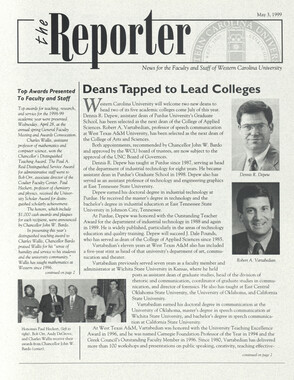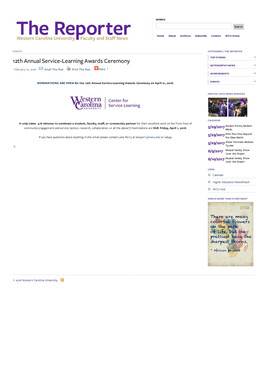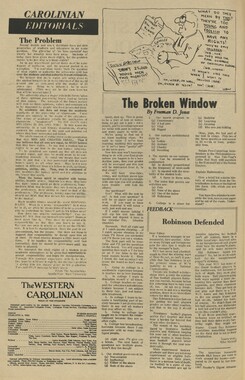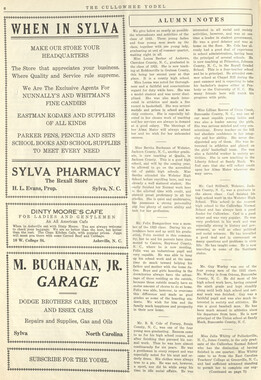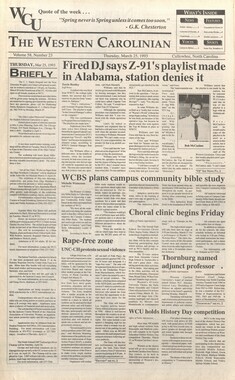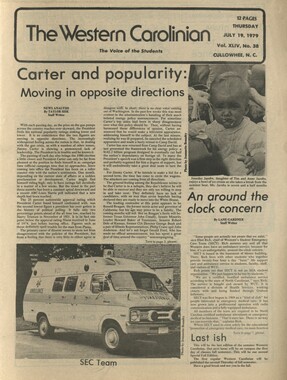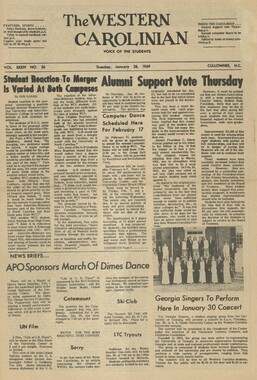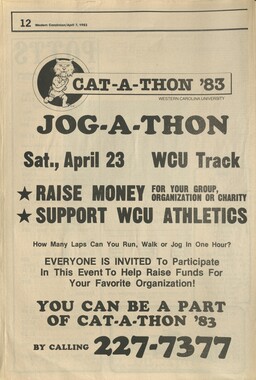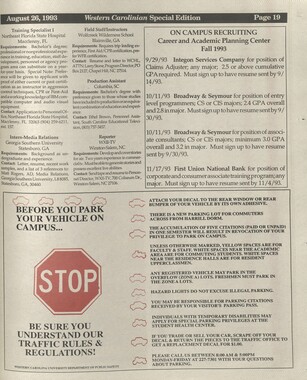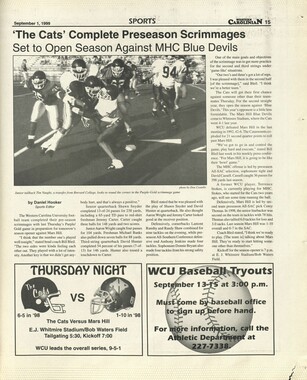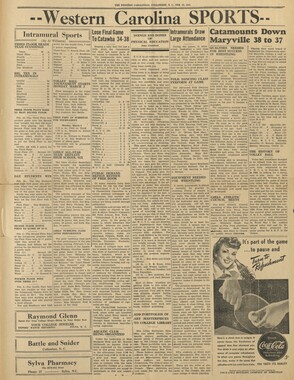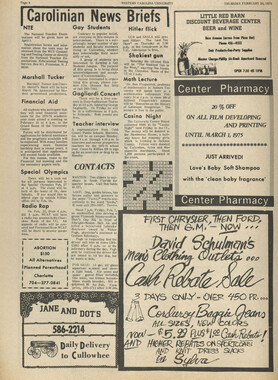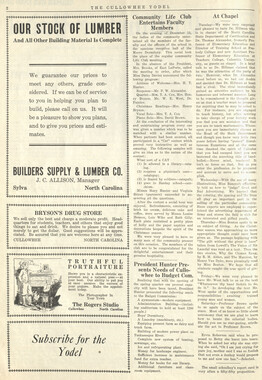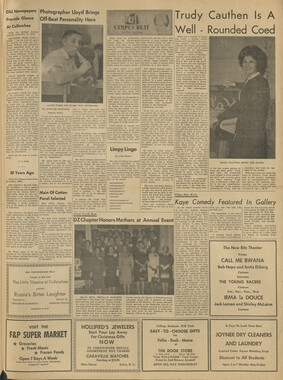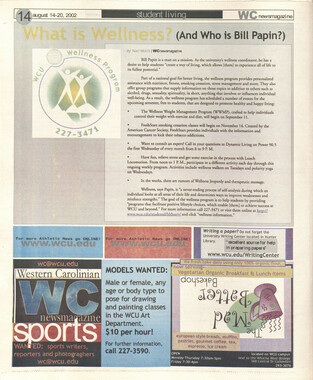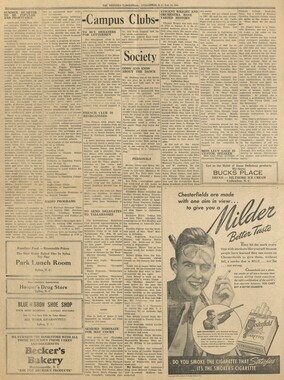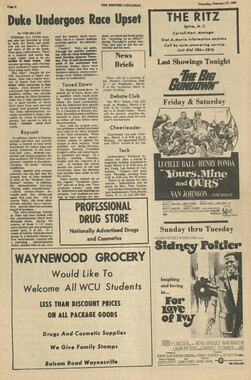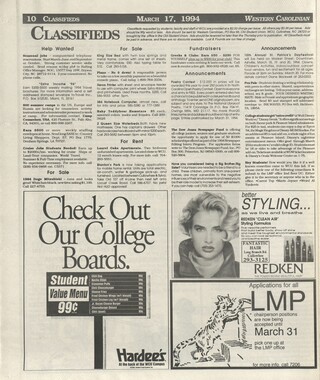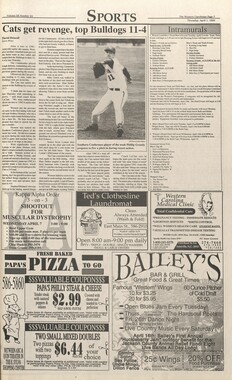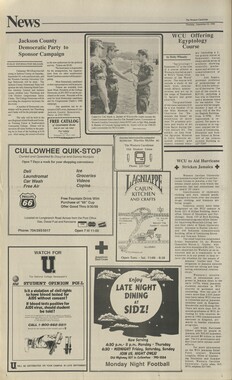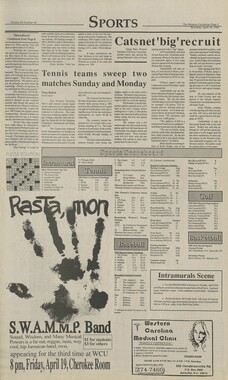Western Carolina University (20)
View all
- Canton Champion Fibre Company (2308)
- Cherokee Traditions (292)
- Civil War in Southern Appalachia (165)
- Craft Revival (1942)
- Great Smoky Mountains - A Park for America (2766)
- Highlights from Western Carolina University (430)
- Horace Kephart (941)
- Journeys Through Jackson (154)
- LGBTQIA+ Archive of Jackson County (85)
- Oral Histories of Western North Carolina (314)
- Picturing Appalachia (6772)
- Stories of Mountain Folk (413)
- Travel Western North Carolina (160)
- Western Carolina University Fine Art Museum Vitreograph Collection (129)
- Western Carolina University Herbarium (92)
- Western Carolina University: Making Memories (708)
- Western Carolina University Publications (2283)
- Western Carolina University Restricted Electronic Theses and Dissertations (146)
- Western North Carolina Regional Maps (71)
- World War II in Southern Appalachia (131)
University of North Carolina Asheville (6)
View all
- Western Carolina College (199)
- Western Carolina Teachers College (239)
- Western Carolina University (1792)
- Allanstand Cottage Industries (0)
- Appalachian National Park Association (0)
- Bennett, Kelly, 1890-1974 (0)
- Berry, Walter (0)
- Brasstown Carvers (0)
- Cain, Doreyl Ammons (0)
- Carver, George Washington, 1864?-1943 (0)
- Cathey, Joseph, 1803-1874 (0)
- Champion Fibre Company (0)
- Champion Paper and Fibre Company (0)
- Cherokee Indian Fair Association (0)
- Cherokee Language Program (0)
- Crittenden, Lorraine (0)
- Crowe, Amanda (0)
- Edmonston, Thomas Benton, 1842-1907 (0)
- Ensley, A. L. (Abraham Lincoln), 1865-1948 (0)
- Fromer, Irving Rhodes, 1913-1994 (0)
- George Butz (BFS 1907) (0)
- Goodrich, Frances Louisa (0)
- Grant, George Alexander, 1891-1964 (0)
- Heard, Marian Gladys (0)
- Kephart, Calvin, 1883-1969 (0)
- Kephart, Horace, 1862-1931 (0)
- Kephart, Laura, 1862-1954 (0)
- Laney, Gideon Thomas, 1889-1976 (0)
- Masa, George, 1881-1933 (0)
- McElhinney, William Julian, 1896-1953 (0)
- Niggli, Josephina, 1910-1983 (0)
- North Carolina Park Commission (0)
- Osborne, Kezia Stradley (0)
- Owens, Samuel Robert, 1918-1995 (0)
- Penland Weavers and Potters (0)
- Rhodes, Judy (0)
- Roberts, Vivienne (0)
- Roth, Albert, 1890-1974 (0)
- Schenck, Carl Alwin, 1868-1955 (0)
- Sherrill's Photography Studio (0)
- Smith, Edward Clark (0)
- Southern Highland Handicraft Guild (0)
- Southern Highlanders, Inc. (0)
- Stalcup, Jesse Bryson (0)
- Stearns, I. K. (0)
- Thompson, James Edward, 1880-1976 (0)
- United States. Indian Arts and Crafts Board (0)
- USFS (0)
- Vance, Zebulon Baird, 1830-1894 (0)
- Weaver, Zebulon, 1872-1948 (0)
- Western Carolina University. Mountain Heritage Center (0)
- Whitman, Walt, 1819-1892 (0)
- Wilburn, Hiram Coleman, 1880-1967 (0)
- Williams, Isadora (0)
- 1920s (57)
- 1930s (69)
- 1940s (114)
- 1950s (66)
- 1960s (314)
- 1970s (599)
- 1980s (406)
- 1990s (379)
- 2000s (195)
- 2010s (83)
- 1600s (0)
- 1700s (0)
- 1800s (0)
- 1810s (0)
- 1820s (0)
- 1830s (0)
- 1840s (0)
- 1850s (0)
- 1860s (0)
- 1870s (0)
- 1880s (0)
- 1890s (0)
- 1900s (0)
- 1910s (0)
- 2020s (0)
- Jackson County (N.C.) (2282)
- Appalachian Region, Southern (0)
- Asheville (N.C.) (0)
- Avery County (N.C.) (0)
- Blount County (Tenn.) (0)
- Buncombe County (N.C.) (0)
- Cherokee County (N.C.) (0)
- Clay County (N.C.) (0)
- Graham County (N.C.) (0)
- Great Smoky Mountains National Park (N.C. and Tenn.) (0)
- Haywood County (N.C.) (0)
- Henderson County (N.C.) (0)
- Knox County (Tenn.) (0)
- Knoxville (Tenn.) (0)
- Lake Santeetlah (N.C.) (0)
- Macon County (N.C.) (0)
- Madison County (N.C.) (0)
- McDowell County (N.C.) (0)
- Mitchell County (N.C.) (0)
- Polk County (N.C.) (0)
- Qualla Boundary (0)
- Rutherford County (N.C.) (0)
- Swain County (N.C.) (0)
- Transylvania County (N.C.) (0)
- Watauga County (N.C.) (0)
- Waynesville (N.C.) (0)
- Yancey County (N.C.) (0)
- Newsletters (510)
- Publications (documents) (1773)
- Aerial Photographs (0)
- Aerial Views (0)
- Albums (books) (0)
- Articles (0)
- Artifacts (object Genre) (0)
- Bibliographies (0)
- Biography (general Genre) (0)
- Cards (information Artifacts) (0)
- Clippings (information Artifacts) (0)
- Crafts (art Genres) (0)
- Depictions (visual Works) (0)
- Design Drawings (0)
- Drawings (visual Works) (0)
- Envelopes (0)
- Facsimiles (reproductions) (0)
- Fiction (general Genre) (0)
- Financial Records (0)
- Fliers (printed Matter) (0)
- Glass Plate Negatives (0)
- Guidebooks (0)
- Internegatives (0)
- Interviews (0)
- Land Surveys (0)
- Letters (correspondence) (0)
- Manuscripts (documents) (0)
- Maps (documents) (0)
- Memorandums (0)
- Minutes (administrative Records) (0)
- Negatives (photographs) (0)
- Newspapers (0)
- Occupation Currency (0)
- Paintings (visual Works) (0)
- Pen And Ink Drawings (0)
- Periodicals (0)
- Personal Narratives (0)
- Photographs (0)
- Plans (maps) (0)
- Poetry (0)
- Portraits (0)
- Postcards (0)
- Programs (documents) (0)
- Questionnaires (0)
- Scrapbooks (0)
- Sheet Music (0)
- Slides (photographs) (0)
- Songs (musical Compositions) (0)
- Sound Recordings (0)
- Specimens (0)
- Speeches (documents) (0)
- Text Messages (0)
- Tintypes (photographs) (0)
- Transcripts (0)
- Video Recordings (physical Artifacts) (0)
- Vitreographs (0)
- The Reporter, Western Carolina University (510)
- WCU Students Newspapers Collection (1744)
- A.L. Ensley Collection (0)
- Appalachian Industrial School Records (0)
- Appalachian National Park Association Records (0)
- Axley-Meroney Collection (0)
- Bayard Wootten Photograph Collection (0)
- Bethel Rural Community Organization Collection (0)
- Blumer Collection (0)
- C.W. Slagle Collection (0)
- Canton Area Historical Museum (0)
- Carlos C. Campbell Collection (0)
- Cataloochee History Project (0)
- Cherokee Studies Collection (0)
- Daisy Dame Photograph Album (0)
- Daniel Boone VI Collection (0)
- Doris Ulmann Photograph Collection (0)
- Elizabeth H. Lasley Collection (0)
- Elizabeth Woolworth Szold Fleharty Collection (0)
- Frank Fry Collection (0)
- George Masa Collection (0)
- Gideon Laney Collection (0)
- Hazel Scarborough Collection (0)
- Hiram C. Wilburn Papers (0)
- Historic Photographs Collection (0)
- Horace Kephart Collection (0)
- Humbard Collection (0)
- Hunter and Weaver Families Collection (0)
- I. D. Blumenthal Collection (0)
- Isadora Williams Collection (0)
- Jesse Bryson Stalcup Collection (0)
- Jim Thompson Collection (0)
- John B. Battle Collection (0)
- John C. Campbell Folk School Records (0)
- John Parris Collection (0)
- Judaculla Rock project (0)
- Kelly Bennett Collection (0)
- Love Family Papers (0)
- Major Wiley Parris Civil War Letters (0)
- Map Collection (0)
- McFee-Misemer Civil War Letters (0)
- Mountain Heritage Center Collection (0)
- Norburn - Robertson - Thomson Families Collection (0)
- Pauline Hood Collection (0)
- Pre-Guild Collection (0)
- Qualla Arts and Crafts Mutual Collection (0)
- R.A. Romanes Collection (0)
- Rosser H. Taylor Collection (0)
- Samuel Robert Owens Collection (0)
- Sara Madison Collection (0)
- Sherrill Studio Photo Collection (0)
- Smoky Mountains Hiking Club Collection (0)
- Stories of Mountain Folk - Radio Programs (0)
- Venoy and Elizabeth Reed Collection (0)
- WCU Gender and Sexuality Oral History Project (0)
- WCU Mountain Heritage Center Oral Histories (0)
- WCU Oral History Collection - Mountain People, Mountain Lives (0)
- Western North Carolina Tomorrow Black Oral History Project (0)
- William Williams Stringfield Collection (0)
- Zebulon Weaver Collection (0)
- College student newspapers and periodicals (1769)
- African Americans (0)
- Appalachian Trail (0)
- Artisans (0)
- Cherokee art (0)
- Cherokee artists -- North Carolina (0)
- Cherokee language (0)
- Cherokee pottery (0)
- Cherokee women (0)
- Church buildings (0)
- Civilian Conservation Corps (U.S.) (0)
- Dams (0)
- Dance (0)
- Education (0)
- Floods (0)
- Folk music (0)
- Forced removal, 1813-1903 (0)
- Forest conservation (0)
- Forests and forestry (0)
- Gender nonconformity (0)
- Great Smoky Mountains National Park (N.C. and Tenn.) (0)
- Hunting (0)
- Landscape photography (0)
- Logging (0)
- Maps (0)
- Mines and mineral resources (0)
- North Carolina -- Maps (0)
- Paper industry (0)
- Postcards (0)
- Pottery (0)
- Railroad trains (0)
- Rural electrification -- North Carolina, Western (0)
- School integration -- Southern States (0)
- Segregation -- North Carolina, Western (0)
- Slavery (0)
- Sports (0)
- Storytelling (0)
- Waterfalls -- Great Smoky Mountains (N.C. and Tenn.) (0)
- Weaving -- Appalachian Region, Southern (0)
- Wood-carving -- Appalachian Region, Southern (0)
- World War, 1939-1945 (0)
- Text (2283)
- MovingImage (0)
- Sound (0)
- StillImage (0)
The Reporter, August 1991
-
The Reporter is a publication produced by Western Carolina University featuring news, events, and campus community updates for faculty and staff. The publication began in August of 1970 and continues digitally today. Click on the link in the “Related Mate
-
-
Reporter A //M < #/%News forr t4-hh\se*\ CF/^aI/cMu 1l/+t1y / a/NnIAdW SC+t/a^If1f of Western Carolina University August 2, 7 997 Cullowhee, North Carolina Below: At Phantom Ranch, Jim Wallace treats Lee Minor for blisters on his feet. or faculty members, the break that comes each May between spring commencement and summer school can be a good time to enjoy any of the vacations in vogue these days. You can explore a Caribbean island, relax at a health spa, travel to Disney World, even take it easy at home. Or, if you have the adventuresome spirit, you can follow the lead of two WCU professors who passed up those tame options to delve into hard rock. But not the music and not the cafe. "Lee (Minor) was talking one day about hiking across the Grand Canyon, and it sounded like fun," said Jim Wallace. "So we did it." "I guess you could call it taking a walk on the wild side," said Minor, now settled into summer school teaching after an awesome adventure that included walking along narrow trails on top of rock precipices. The journey of Minor, Wallace, and Wallace's son, Jim III, a recent graduate of North Carolina State University, took four days. They started from the North Rim and followed the North Kaibab Trail down fourteen miles to the canyon bottom (a descent of more than 5,000 feet), crossed the Colorado River, and hiked up the rugged Bright Angel Trail to the South Rim. Their total walking distance was twenty-four miles. A motorist driving from north to south along the canyon rim would travel 250 miles. "It really wasn't a difficult hike at all," said Wallace, who has also hiked parts of the Appalachian Trail and the White Mountains of New Hampshire. "We used a simple philosophy: slow and sure. The turtle wins the race." Most tourists view the Canyon from the South Rim. "From there you'd think it's mostly just rocks," said Minor. "A big ditch," said Wallace. But, the professors said, sightseers who use the foot trails pass through several biotic regions of breathtaking natural beauty. They saw magnificent forests of conifers, douglas fir, pinyon pines, and juniper trees, deserts filled with cactus and colorful wildflowers, hills of ferns, and beautiful oases. "And there is the awesomeness that comes when you realize you are walking along rocks from the pre-Cambrian age. A billion, two billion years old," said Wallace. "These were rocks that were deposited before multicellular life existed on earth—before plants and animals inhabited the land." Hikers have died in the Canyon from exposure, lack of food and water, heat exhaustion, falling off rock precipices, and drowning in the Colorado River. "I'd read all the horror stories about what can happen to you down in there," said Minor. "But I'd been to the Canyon twelve times. After a while, it just wasn't enough to look down from the top anymore." Many of Minor's trips to the Canyon were made while he was teaching at Northern Arizona University in Flagstaff, Ariz., as part of a faculty exchange program in 1985. Minor and Wallace share a love of landscape photography. On their trip, the professors carried cameras and took more than 400 color slides. They also shared a malady common among Canyon hikers—painful blisters on their feet. Spending their nights on the ground at campgrounds, they carried all their food and water, trail maps, supplies, cont'd, last page Walking on the wild side News briefs FROM GARDEN CLU B MEMBERS TO PROFESSIONAL HORTICULTURISTS, about 450 people converged on campus July 25-27 for the annual Landscaping with Native Plants conference. Organizers aim each year to increase interest in and knowledge of native Southeastern plant species in landscaping. The meeting, which has been held each year since 1984, is sponsored by the Division of Continuing Education and Summer School and coordinated by Dr. Jim Horton, professor of biology. Dr. J. Dan Pittillo, professor of biology, was also among speakers. Field trips took participants to the North Carolina Arboretum and Biltmore Gardens, Joyce Kilmer Memorial Forest, and along the Blue Ridge Parkway. The conference also featured six concurrent sessions each day and a "walking workshop" among gardens on campus. This is the final issue of the Reporter before summer commencement. Publication will resume August 30. Exhibits Oil paintings by Mary Parker. Belk Building art gallery, 9 a.m.-4:30 p.m. Monday-Friday and by appointment at 227-7210, through August 8. Photographs by Larry Tucker and Dr. James Wallace, and "Diversity Endangered," a poster exhibit. Natural Sciences Building, 7:30 a.m.- 10 p.m. Monday-Friday. "Irons in the Fire," an exhibit and slide-tape presentation on blacksmithing:* "Forging Ahead," a sampler of the diversity of today's iron works; and "Migration of the Scotch-Irish People," a permanent exhibit. Mountain Heritage Center, 8 a.m.-5 p.m. Monday- Friday. •Weather permitting, blacksmithing demonstrations are held 2-3:30 p.m. at the west entrance of the Robinson Administration Building (in front of the Mountain Heritage Center) on the first and third Wednesdays of each month. WESTERN CAROLINA UNIVERSITY Monday 5 Seminars, "Teacher Scholars in Residence" and "You Can't Drive with the Emergency Brakes On." North Carolina Center for the Advancement of Teaching. August 4-9. 19 Special registration for graduate students. Registrar's Office, 5-7 p.m. 26 Special registration for orientation students. RAC, 10:30-4 p.m. Orientation for new faculty. 8:30 a.m.-4 p.m. 227-7495. Registration for WCU classes in Asheville. Karpen Hall, UNCA, 4:30-6:30 p.m. Tuesday 6 20 27 Registration continues, schedule changes. RAC, 9 a.m.-4 p.m. Freshman Convocation. RAC, 4-5:30 p.m. Evening classes begin in Asheville and Cullowhee. 6 p.m. Hunter Library hours Regular summer hours Monday-Thursday Friday Saturday Sunday 8 a.m.-11 p.m. 8 a.m.- 6 p.m. 9 a.m.- 6 p.m. Noon-11 p.m. Closed Saturday and Sunday, August 10 and 11 August 12-26 Monday-Friday Saturday and Sunday 8 a.m.-5 p.m. Closed For more information, call 227-7307. Wednesday 7 Blacksmithing demonstration. West entrance, HFR (in front of MHC). 2-3:30 p.m. (weather permitting). 21 Reception and General Faculty Meeting for fall semester. MRH, 8:30-10:30 Cullowhee Campus Capers. RAC, 11:30 a.m.-l:30 p.m. Blacksmithing demonstration. West entrance, HFR (in front of MHC). 2-3:30 p.m. (weather permitting). Deans' meetings with department heads. 3-5 p.m. 28 Day classes begin. 8 a.m. Late registration and schedule changes. RAC, 9 a.m.-4 p.m. August 2, 1991 The Reporter Auau 1 Thursday 8 Institutional SAT. 223 Forsyth Building, 8:30 a.m. For more information, call 227-7469. 22 School faculty meetings. 8:30 - 11 a.m. Faculty Senate. 104 Killian Building, 1:30-3 p.m. Registration for WCU classes in Asheville. Karpen Hall, UNCA, 3-6 p.m. 29 Late registration and schedule changes. Registrar's Office, 8 a.m.-5 p.m. Friday 9 Commencement exercises. RAC, 7 p.m. Post-commencement reception for graduates and families. Hospitality Room, RAC, 9 p.m. 23 Retreat for WCU Teaching Fellows. NCCAT, through August 25. Orientation for new transfer students. Check in at UC, 7:30- 8:30 a.m. (Special registration, RAC, 2:45-6 p.m.) Departmental faculty meetings. 9 a.m.-noon. English Proficiency Test. University Writing Center, Hunter Library, 2 p.m. Meeting of general education faculty with department heads, 2-3:30 p.m. 30 Late registration and schedule changes. Registrar's Office, 8 a.m.-5 p.m. Labor Day holiday begins at 5 p.m. for faculty and staff members. Runs through September 2. Saturday 10 Sunday 11 No events listed with Office of Public Information for Saturday, August 10, through Sunday, August 18. 24 Men's and women's cross country, Cats at Maggie Valley Road Race. Maggie Valley. 31 Football, Cats vs. University of Georgia. Athens, Ga., 1 p.m. 25 Residence halls open for students attending orientation. 8 a.m. Orientation check-in for new freshmen, parents, and transfer students. UC, 9-11 a.m. Orientation runs through August 26. Residence halls open for all students. Noon. Reception to honor all faculty and staff members. Chancellor's Residence, 3:30-5:30 p.m. Dinner to honor all new faculty and staff members. RAC, 6 p.m. Key- HFR H.F. Robinson Administration Building MHC Mountain Heritage Center MRH Music Recital Hall RAC Ramsey Activity Center UC University Center The Reporter August 2, 1991 The Reporter is published by the Office of Public Information. Mail notices and changes of address to the Reporter, 1601 Ramsey Center. 1,450 copies of this public document were printed at a cost of $152.37, or $.11 per copy. Western Carolina University is an Equal Opportunity Institution. Walking cont'd and tent. Minor served as guide, Wallace the cook. Trail cuisine consisted mostly of cream of wheat, oatmeal, tuna, jerky, macaroni and cheese, and candy. For the few days on the trail, no one complained about the lack of amenities. "There's a saying that if you travel first class, you don't see anything. But if you go fifth class, you see the world," said Wallace. While in the Grand Canyon, Wallace the botanist got a close look at a plant that interests him— ephedra, a primitive gymnosperm used by the Mormons to make tea. Did Minor have a chance to apply his speciality, mathematics? "Arithmetic. I knew we had four days to cover twenty-four miles of trail. That came out to seven, seven, five, and five." What's next on the itinerary? For Wallace, "England and Scotland on foot or a bicycle." And for Minor? "I'll probably go back to the Canyon. It really is a grand place." Does a hike across the Grand Canyon sound appealing to you? Call Minor at 227-7245. He's organizing a return trip next May. Wallace may join him. Because of the popularity of hiking in the Canyon, reservations at campgrounds are made months in advance, so call Minor soon if you're interested. —Christy McCarley Carter elected to national board of directors Dr. C.J. Carter, vice chancellor for business affairs, has been elected vice-chairman and chairman-elect of the board of directors of the National Association of College and University Business Officers (NACUBO). Carter will succeed current chairman Carl E. Hanes, Jr., of the State University of New York at Stony Brook in July of 1992. Carter is serving his second year on the NACUBO board, having been elected to a three-year term at the association's annual meeting in Hawaii last year. He assumed the vice-chairman's office at the annual meeting July 23 in Nashville, Tenn. The National Association of College and University Business Officers is the primary professional organization for business officers in higher education and has about 2,100 member institutions. Carter served as president and first, second, and third vice-president of the 900-member Southern Association of College and University Business Officers, largest of four regional NACUBO associations, before joining the national board. WCU's first black professor to speak at summer commencement Henry Lewis Suggs, the first black professor to teach at Western Carolina University, will return to campus Friday, Aug. 9, to address graduates at the 1991 summer commencement exercises in the Ramsey Center. A total of 251 students are candidates for graduate and undergraduate degrees, pending final examination and review. Commencement exercises will begin at 7 p.m. and will be followed by a reception for all graduates and their families in the Hospitality Room of the Ramsey Center. Suggs, an associate professor of history at Clemson University since 1983, was assistant professor of history at Western from 1974 to 1976. WCU's Organization of Ebony Students recently established the Henry Lewis Suggs Award of Excellence, presented to the student who has exemplified outstanding scholastic achievement, leadership, involvement and dedication to the campus and community. Before coming to Western, Suggs was assistant professor of history at Hampton Institute from 1968 to 1972, and after his years at WCU he was assistant professor of history at Howard University from 1976 to 1983. Professors lead electronic component seminar Dr. Jim Turner, William Medaris, and Ken Ayala, associate professors of industrial and engineering technology, were among leaders for an electronic- component seminar sponsored in May by the southeast chapter of the National Electronics Distributors Association (NEDA) and WCU. The university's industrial distribution program hosted the three-day seminar for sales personnel and manufacturers representatives. Companies sending participants to the seminar included Dixie Electronics of Columbia, S.C.; Hammond Electronics of Greensboro; Electronic Equipment Company of Miami, Fla.; and Dow Electronics of Tampa, Fla. Russell Herring of Dixie Electronics, who is NEDA southeast representative, also served as a seminar leader. August 2, 1997 The Reporter Re•p Nno//emw j/sr 4fro\rrr fhe tFoma/c^ieu il#tfyw /a-*nrr-»dw cSftma f f of Western Carolina University August 30, 1991 Cullowhee, North Carolina Welcome to 1991 -92 academic year M "I would encourage all of you—for that matter, the whole university community— to support the university programs both on and off campus." -Dr. Jim Wallace, Chairman of the Faculty any significant comments were made during the general faculty meeting in the Music Recital Hall on August 21, opening the 1991-92 academic year. Here is a summary of the remarks. DR. ANNE ROGERS, Honors Program director: Some of you who are here participated in the "Year of the Student" program, and you realize what an exciting and unusual program it was. But for those of you who were not privileged to be part of it, I think this overview will give you some understanding of what we learned from students and what we learned about ourselves from the "Year of the Student" program. As part of our continuing focus on teaching excellence, we developed this innovative program, which involved both students and faculty in an unusual learning experience According to the visiting experts who met with us during the year, the program represented a new and exciting way of examining the teaching and learning process. Faculty were concerned with several questions: The first was whether accepted theories of intellectual development are indeed applicable to Western Carolina University students. Another question concerned the role of general education in the learning experience of our students and their perception of this program. A third was to gain insight into the general climate for learning here at WCU. A core faculty was selected to take part in the program. They were asked to participate in student/ faculty colloquia and to attend workshops and other activities featuring visiting scholars. Students from each of the four classes participated as members of a panel which discussed relevant questions or as participants in faculty/ student discussion groups. Students were asked to read a paper on personal theories of learning prior to participation and were expected to come prepared to discuss their views on learning and on themselves as learners, on the role of general education in their experience here at WCU, and on the academic climate. Students in general were straightforward in their comments—and that's kind of an understatement—and extremely perceptive concerning the issues under consideration. Faculty were selected on the basis of their expressed interest in effective teaching and were asked to commit approximately thirty hours to the program. Attendance and participation in discussion by these faculty members was outstanding. It's clear that WCU faculty have a strong commitment to effective teaching and a willingness to learn, not only from the experts, but from our own resident experts, the students themselves. They should be commended for their interest and enthusiasm. Visiting scholars who participated in the "Year of the Student" included Dr. John Gardner of the University of South Carolina, internationally known for his development of the "Freshman Experience" program; Dr. Patricia Murrell of Memphis State University, an expert on William Parry's theory of learning stages; and Dr. Dawn Persons of Columbia University, who is a specialist on problems of minority students. Each presented a workshop as well as a public lecture, and all were well received by both students and faculty. The result of this exceptional program was an enhanced appreciation of the teaching/learning process by both students and faculty. This was facilitated by the lively interaction of the students and faculty, which characterized all four colloquia. Our findings in some cases verified faculty expectations. We all learned some new things about students as a result of this experience. As is true of college students in general, WCU students move through predictable stages of development through their college careers. They also understand that learning takes place in places other than the classroom and that this is an important component of their educational experience. They prefer enthusiastic instructors and "aren't fooled by an instructor who doesn't want to be there." They said that the often-quoted rule of thumb that one hour in the classroom requires two hours of outside study is too simplistic, because time needed for study varies greatly with the course and with the "It's clear that WCU faculty have a strong commitment to effective teaching and a willingness to learn " -Dr. Anne Rogers August 30.1991 Welcome cont'd instructor. Freshmen and sophomores were looking forward to taking major courses, and juniors and seniors were excited they were finally in those courses. Upperclass students were in general agreement that major courses are very challenging, enthusiastic instruction was appreciated, and students know when you are enthusiastic and engaged and involved in what you are teaching. On the topic of general education, seniors have a greater appreciation of the program when they're out of it than do freshmen or sophomores who are in it, perhaps because of greater maturity, perhaps because they can see the relevance of general education to their overall educational process. While students who had never attended another college or university found it difficult to assess the educational climate here, transfer students commented favorably on this topic. A number of important topics specifically affecting faculty emerged from this program: We need more exposure to theories of cognitive development, especially those of us who teach freshman and sophomore courses. This will provide an enhanced understanding of the most effective methods for presenting material to these students. We need more information about the changing demographics of incoming students and about the changing nature of their experiences in high school and elsewhere. Most of us know that life as a student today is not the same as it was in the past, but we may not comprehend all the significant differences. We need to be more aware of multicultural aspects of today's society and to value students' diversity. We need to emphasize the importance of general education courses in the overall experience of these students so that they will know that they are not just courses to "get out of the way," as they put it, but an integral part of their academic experience. Most of all, perhaps, faculty need to continue to interact with students outside the classroom as well as in, and to appreciate more fully their abilities and their accomplishments. Through programs like the "Year of the Student," we're making it clear to students and to faculty alike that we not only talk about excellence in teaching, we're willing to work together to achieve it. DR. JIM WALLACE, Chairman of the Faculty: Primarily for the benefit of the new faculty, I would like to briefly summarize the accomplishments of the 311 full-time faculty members in the last academic year. In addition to teaching over 6,000 students and serving on who-knows-how-many departmental, school, and university committees, we've found time to publish 245 articles, seven chapters, nineteen books, and thirty-five book reviews. We made 484 presentations at society meetings. We attended 589 professional society meetings. Thirty-nine of us— that's more than ten percent of us—served as elected officers of regional, national, or international societies. This included five society presidents. In addition to this, numerous talks were given to local groups, and a tremendous amount of effort was put into student activities and recruitment. This information has come from my interpretation of annual reports of the various schools Over the past several years, one of my goals has been to improve academic standards at Western Carolina University. The Senate has acted on proposals from committees and/or councils, and approved a new "W" policy, a revised course-repeat policy, a revised student-retention policy, and a new academic-honesty policy. This year the Faculty Center for Teaching Excellence will be emphasizing academic standards at Western Carolina University. I cannot predict whether or not this group will send recommendations to the Senate, but I am concerned—and I hope many, if not all of you, are concerned—about academic standards. One of the events that triggered my interest in academic standards happened on May 11,1991. Most of you remember this as graduation day at WCU, but it was also graduation day at North Carolina State University. I missed the WCU graduation because my son graduated from NC State with approximately 2,500 other students. What triggered my concern was the fact that the chancellor at State recognized seven students with 4.0 averages, out of 2,500. At Western Carolina, with approximately 600 graduates, there were twelve students having 4.0 grade averages. The numbers seven and twelve are not too different, but projecting Western Carolina's twelve up to 2,500 students means, on the same basis, we would have had approximately fifty 4.0 students to their seven I don't know what that means, but I think it should be discussed. In 1978, when you consider all our general education courses, there were twelve percent As and thirteen percent Fs In 1989, twelve years later, there were sixteen percent As—a rise—and seven percent Fs—a decrease. What does this mean? Again, I don't know, but I really believe it should be discussed I know of colleagues who keep grades up to keep students in classes. How do the majority of you feel about this? It should be discussed, especially at the departmental level, where some instructors constantly have higher grade distributions than their colleagues for the same courses. In some of these courses there are the extremes where some of the The Reporter instructors will give about twenty percent Fs and other instructors will give no Fs. As I mentioned earlier, the topic to be emphasized by the Faculty Center of Teaching Excellence is academic standards at Western Carolina University. I would encourage all of you to participate during their noon discussions. These are very open discussions. I've been to many. Nobody ever feels intimidated that I've seen. You will also discover new friends. Another thing that you will learn is that all over campus we have the same kinds of problems bothering us. Your problems are not unique. It's an eye-opener to go these groups This is my last year to serve as chair of the faculty. It has been an honor, a lot of work, and a lot of fun serving in this capacity, and I have had no regrets. Besides the duties spelled out in the constitution, the chair is expected to meet bimonthly with the vice-chancellor for academic affairs and monthly with the chancellor. You learn a lot about the behind-the-scenes functioning of the University When I took this office, I thought I would be able to meet all of the faculty—I even said this— and to get input from everyone. That just did not work. The time did not avail itself. I have heard, and I still do, a lot of grumbling as to why the chancellor, the vice chancellor, even some of the deans don't get around campus to meet everybody. I can fully appreciate this now When I accepted this position, I thought that I would be told to do a lot of things. Well, this did not happen. The vice chancellor and the chancellor were very clear from the beginning that they were not going to tell me what to do. When I asked, they would advise, but they made it clear that it was only advice. Some of their advice I heeded; others, I did not. Based on my experiences, I cannot visualize why anyone of you could not interact with any of the administrators. I can truthfully say that I have only experienced cooperation. Why am I saying this to you? Because my final term is about to expire, it's time to choose another candidate to serve as chair of the faculty, and I wanted you to know how I have interacted with the system. I would encourage you to give serious consideration to serve in this capacity. The elections are five months away. The Catamount Club, the music program, the theatre, the art exhibitions all need our support if we want Western Carolina University to excel. Bob Setzer, our athletic director, told me that he would encourage the coaches and athletic staff to support and be more enthusiastic toward the music, art, and theatre programs if the faculty would be more enthusiastic toward the athletic program. Currently, only nineteen percent of the faculty belong to the Catamount Club. I would encourage you to consider joining the Catamount Club. Many The Reporter of the academicians do not want to admit it, but the athletic programs give the university a tremendous amount of publicity, and this enhances student interest and hence student recruitment I would encourage all of you—for that matter, the whole university community—to support the university programs both on and off campus. I can assure you, as I've found out, it will add a new dimension to your life and to your family's lives Some of you may be wondering if you've been appointed to a council or a committee this year. What you will need to do is check in the faculty handbook, the appendix section, the first part (8.01), and this will list all of the council and committee appointments. This listing will be in lieu of the formal letters received in previous years. DR. MYRON L. COULTER, Chancellor: It was a long year for everybody last year, but we'll try to make this year a little better, at least in terms of the news that we have to deliver. And we also hope that in this succeeding year our leaders in the General Assembly will find ways to bring the appropriate recognition to the university system for the distinguished faculty which all of you are and the deserving faculty which all of you are and recognize that there must not only be an increase in your compensation. There must also be recognition that while you did not receive an increase this year, you also received an additional hit with your health insurance and other matters which have deepened the difficulties which all of you face in going to the marketplace. We all know that, and we all appreciate what you are experiencing. The General Assembly is also aware of that, and I must say that I've talked with a number of them this year, and they faced a very difficult problem which has been partially resolved, but there are some miles to go before they're finished with their work, and they know that. We hope that all of our economy, the conditions in the state, experience an upturn so that we can get back to where we feel we should be as a university, as one of sixteen, certainly, and as one of many in the state of North Carolina that is discharging a very important responsibility and doing it very well, of preparing young people—and older people—to assume new levels of responsibility in improving our society Western Carolina University's recent past and immediate future are colored by the threat and realization of diminished resources. Our budgets have been eroded by outright reductions, position and expenditure freezes, and inflation. Both people and programs have been put at risk and real losses have occurred—eighteen positions and $2.9 million in 1990-91, twenty-nine positions and $2.6 million August 30, 1991 4 .. our first responsibility is to provide the best possible education we can for the students we have." -Dr. Myron Coulter August 30. 1991 Welcome cont'd in 1991-92. On the plus side, I'm pleased to report that the university's enrollment growth was partially funded, bringing $1.1 million back to Western. That is being used to restore most of the previously lost faculty and staff positions. As we begin the 1991-92 academic year, reduced appropriations and continuing uncertainty about the state's fiscal health compel us to choose carefully programmatic and operational priorities to guide our utilization of available resources. We must constrain adoptions of new programs, curricula, and commitments that cost money. And we must practice cost containment in all our activities. No matter what level of resource that we receive from the state, I assert, as I believe you do, that our first responsibility is to provide the best possible education we can for the students we have. Our first priority, then, must be given to maintaining courses and educational opportunities that students need to complete studies in their majors and maintaining access to the general education courses that all students need. That principle has been observed in allotting the available funds to our many program needs for 1991-92. Faculty development must be sustained. Research, scholarly productivity, and other faculty development activity remain highly valued functions. The present circumstances, however, require that a greater percentage of our resources in time and money be devoted to our immediate teaching activities. While other areas of faculty endeavor thus proceed more slowly, the continuity of faculty development must not be interrupted. Service will continue to be an important component of the professional activities carried on by our faculty and staff. Where the university is the source of support, priority will be given to maintaining the service commitments now in place. Our university advancement programs must be emphasized more acutely than in any recent decade. Where outside funding can be obtained, we must aggressively pursue constructive new opportunities to apply our capabilities in service to the academy and to the public interest. As we speak of priorities and their bearing on this faculty's endeavors, we should note that the preeminence of the university's academic mission has been respected in determining where and how to absorb the university's budget reductions that have been imposed. Where possible and permissible, relatively larger cuts were taken in administrative and support areas in order to relieve the strain on academic assets. Let us be mindful, then, that all parts of the institution are feeling the pinch. Let us be understanding and supportive of all our colleagues' efforts to preserve productivity and quality in their respective comers of the university. Quality indicators. As is my custom, I take this occasion each year to recount to you the achievements which you and your colleagues across the university have accomplished in the preceding academic year. During years such as we are presently experiencing, it is particularly significant that you are continuing to extend the upward-moving quality of teaching, service, and research at Western. Our students, undergraduate and graduate alike, reflect the commitment of the faculty to constantly improve the academic climate and the resourcefulness which has become a hallmark of the decade of the eighties and nineties at Western. In the midst of those sharp budget reductions, I want you to hear some—certainly not all—of the contributions which you have made to Western's significant effectiveness. You've already heard from Professor Rogers of the program the "Year of the Student," which was indeed a great success. The University of North Carolina Center for Public Television established a communications education center for Western North Carolina, housed within the Division of Continuing Education and Summer School. We've completed the first full year of operation under your Faculty Senate reorganization as all five major councils of the Senate begin developing and working on their agendas. Of particular importance in this reorganization was the action to develop a more streamlined process for curriculum change. One of your colleagues, Hal Farwell, in the English Department, taught in Indonesia as a senior Fulbright professor. One of our students, Deborah Barnard, was awarded a Fulbright teaching assistantship in France, our third student Fulbrighter in the past three years. Another student, Kefyn Catley, was awarded a full fellowship for graduate study at Cornell. We've initiated the satellite registration program to decentralize the registration of continuing students by conducting registration in the schools and the CAP Center. The result was a much more efficient process and a better-quality contact between faculty and students. Our School of Technology and Applied Science received over $70,000 in equipment, in grants and scholarships from industry and professional societies. The upper-division courses in Electronics Engineering Technology, Manufacturing Engineering Technology, and Industrial Technology will enter the second year of being offered on the A-B Tech campus. There are currently 115 active students in these three programs. A proposed agreement is outstanding between Western Carolina University and the Hogeschool West-Brabant to take our graduate programs in business to Holland next year as a part of a new The Reporter educational exchange. The program will allow Dutch students at the Hogeschool to take prerequisite business courses in Holland, then come to Western to complete their Master of Business Administration or Master of Project Management degrees. Western students will benefit from the cooperative agreement through internships offered by companies in the Netherlands, to be arranged by the Hogeschool West-Brabant. A survey of all master's degree candidates in 1989 and 1990—sixty-two graduates—was conducted by Ann Little. She found that fifty percent of the graduates with MBA and MPM degrees are employed in North Carolina. The average salary reported by these graduates was $41,200. Maybe we should all go back to school. With the cooperation of the School of Arts and Sciences, the School of Business will initiate a program in international business beginning with the fall semester. For the fourth straight year, a national study conducted by the University of California at Los Angeles recognized Western's business school among the leaders nationally in providing quality microcomputing resources for its students. Western Carolina ranked second after East Carolina among institutions in North and South Carolina in that UCLA study The O. Max Gardner award which was presented [by the University of North Carolina system], and richly earned by Rick [Harrison, professor of biology], was the first that Western had received in, I think, fifty-some awards that have been made. We are the seventh university of the system to receive that recognition. This was one of the few years that only one faculty member was singled out from the 8,000 or so faculty members in the university system for this award. And it went to Rick. I can assure you that there will be other recognitions coming now from the Board of Governors to Professor Harrison for his fine work The School of Arts and Sciences was able to add a tremendous amount of new equipment for the science programs The Natural Sciences Auditorium, a major classroom facility was dramatically enhanced by the addition of a video-sound system designed to interface with videotapes, videodiscs, and computers to improve our instructional capabilities. The first-year lecture series at Highlands Library, which was delivered by the School of Arts and Sciences, has been so successful that the sponsors there at Highlands have said that they want to do it for another year. It's a great tribute to you. Our extension enrollments, offcampus credit courses in Continuing Education and Summer School, increased by thirty percent International extension activities were conducted in Jamaica, the Dominican Republic, and Scotland. Our second The Reporter commencement exercises were conducted June 1 in Kingston for the most recent seventy-seven Jamaican graduates of Western Carolina University. We've had over 3,000 Jamaicans taking courses for credit and toward degrees in Jamaica, and as you know, we've been designated as the university to provide the master's program for their school counselors and teachers. The number of conferences taking advantage of the setting and facilities at Weston for their summer meetings increased by nineteen percent over the preceding year. Two of the new groups on campus this summer were the Foxfire Institute, which worked with teachers and a demonstration class of elementary-school students to explore Foxfire methodology in the classroom, and a group we all know and love, the Sweet Adelines, who filled the campus with the mellow sounds of their music. The outstanding international dance troupes and musicians of Waynesville's excellent Folkmoot brought even larger numbers of performers and programs to Western in July and August Associate Professor Vivian Deitz and Assistant Professor Barbara Larson Lovin of the School of Nursing and Health Sciences received their doctorates this year. That's a proud thing for all of us. Associate Professor Dan Southern of the School of Nursing and Health Sciences is president-elect of the North Carolina Medical Technology Society. Dan's Clinical Laboratory Sciences program has been singled out as a national model for providing a program for associate-degree technicians to earn their baccalaureate degrees while working. In addition, a reviewer for the national accrediting agency for clinical laboratory sciences referred to Western's program as "a prototype of clinical laboratory science programs for the country." Librarian Bill Kirwan and his staff have established a new support group for the library, the Friends of Hunter. I understand that that's still growing in good stead. Our library's performance as a federal depository for government documents is reviewed by the government's printing office every five years. The official who conducted this year's visit and our review rated it "a top-quality repository" and gave high marks to the staff. An important step forward in providing access to the resources of other libraries is that terminals in the reference department of our library now can access the online catalogs of all sixteen universities in the North Carolina library system and many of the major research libraries throughout the country. An important event occurred not only for our library but for the entire campus when nationally acclaimed author Sue Ellen Bridgers of Sylva donated her manuscript collection to Hunter Library's Special Collections. Her manuscripts and first editions are invaluable to all scholars M . . . t h e u n i v e r s i t y ' s academic mission has been respected in determining where and how to absorb the university's budget reductions " Dr. Myron Coulter August 30, 7997 6 "Despite reduced budgets and many frozen staff positions, the Business Affairs division had a solid record of accomplishment over the past year." -Dr. Myron Coulter August 30. 1991 Welcome cont'd who are interested in her type of literature. We are most fortunate to have this collection. Assistant Professor Lisa Bloom and Assistant Professor Ellen Bacon of the School of Education and Psychology received a grant of $51,300 from the United States Department of Education to support a program to prepare teachers for students with behavior disorders. This program will involve the recruitment of graduate students, improvement of the curriculum, and development of a portfolio model of evaluation. Our School of Education and Psychology conducted numerous conferences and special programs this year... for the betterment of public school programs, certainly in Western North Carolina, and throughout the state, in many respects. The Center for Mathematics and Science Education received at total of $80,000 in outside funding, and our Developmental Evaluation Center received $970,000 from nine separate contracts and budgets. Our faculty in the School of Education and Psychology spent considerable energy and time this past year in revising the professional education programs and preparing for the November 1991 reviews by NCATE, their accrediting society, and the North Carolina Department of Public Instruction. I believe we still have among—if not the—most rigorous admissions program for students into teacher education in the state system of North Carolina. The 1990-91 academic year marked the university's seventeenth year of operation on the UNC-Asheville campus. The year could be characterized as the best ever in terms of facility support Facility support for our programs in Asheville now includes a well-equipped computer laboratory, sixteen classrooms for evening classes, and an adequate number of faculty and staff offices. And very recendy, within the last week, the new chancellor at UNC-A, Chancellor Schuman, came to Western and visited us. I spent the entire afternoon with him. We got acquainted, we discussed our cooperative relationships between our two institutions, and each of us has taken the pledge to see that those cooperative arrangements can be even further enhanced. And then I was pleased and privileged to give my colleague a very extensive tour of our beautiful campus, which he enjoyed very much. One of his comments, which I can make when I go see his campus, is 'This is what a university should lode like." That's nice. So the new chancellor at Asheville appears to be a person who wants to work with us, and we're delighted with that relationship. Our first university-wide undergraduate research conference was held in March, and as you've probably already heard, the results were most gratifying. Over forty papers were nominated by you, our faculty, and presented by your students at that conference. Certainly this activity will grow as more of you and your students generate interest and involvement in undergraduate research. Accreditation activity. A word or so about our accreditation status at this point: The Manufacturing Engineering Technology program received a maximum accreditation by ABET, the Accreditation Board for Engineering and Technology. The Social Work Department was reaccredited for seven years by the Council on Social Work Education. The Department of Music in the School of Arts and Sciences received full accreditation for five years from the National Association of Schools of Music. The School of Nursing and Health Sciences received reaccreditation of Medical Record Administration and Clinical Laboratory Sciences, with Clinical Laboratory Sciences being cited, as I mentioned, as a national model program for its work with adults. Grants and contracts. Our 1990-91 grants and contract activity is encouraging, as reported by Dean Hickey The number of awards increased from seventy-two to ninety-five. That's a thirty-two percent increase in success. That's very gratifying. And the amount of the awards increased by sixteen percent, to $4,016,467, an excellent increase in success for our grants and contracts program, and when compared with other institutions in our system, places Western in a very, very fine spot, well above the average of universities in our system. Business affairs. Despite reduced budgets and many frozen staff positions, the Business Affairs division had a solid record of accomplishment over the past year. Effective management and extra effort by all employees enabled the division's operating units to overcome many of the limitations resulting from the state's revenue shortfall. Due to repeated allotment cuts, unfunded reserves, position freezes, and categorical limitations on purchases, it was extremely difficult to conform budgets to frequently changing conditions and to manage spending throughout the past year, especially so at fiscal year end. Those who receive, dispurse, and budget our funds, who purchase the goods and services that all of us use and manage our position vacancies worked hard and skillfully to devise strategies for responding to all these fiscal disruptions, while keeping our spending for ongoing operations on an even keel. I want to express my thanks to all of you and to my other colleagues in the business office for your understanding and cooperation in accommodating The Reporter the needs we had this year. I think we have suffered minimal damage, certainly reparable damage, and we are restoring, we are recovering, and we are getting ourselves back to where we really belong and in a position to grow even further. Many improvements and repairs have been completed in the residence halls to improve the quality of life for our students. Reynolds Hall, as you probably know, is undergoing a complete renovation, which began in December of 1990 and is scheduled for completion this month. Scott, Walker, Leatherwood, Albright-Benton, and Harrill Halls all received major repairs and upgrading of the private and the public areas to substantially improve the living qualities of those dorms. Recognizing rising concern over campus crime problems nationally, our Public Safety Department introduced programs on crime prevention and crime awareness in freshman orientation for the first time. I have sent the required reports that go to the General Administration, the Board of Governors, and on to Washington, on criminal activity on campuses. I've reviewed it, and I must say that we are an extremely good position when compared with other universities whose reports we have seen in terms of the low level of activity on our campus. I am very gratified by that. It's never good enough, but at least it's good to know that we are getting the job done and our students and all of us who live in this community are acting responsibly. As you know probably, our University Print Shop was relocated to expanded quarters in the old warehouse, down by the old power station, near the old jogging trail. The new facility permits greatly increased production efficiency, and new equipment has been installed to improve production capacity and overall quality of quick-copy printing, so you ought to have better service out of the Print Shop. You've seen the beautiful facilities for the North Carolina Center for the Advancement of Teaching. They are indeed beautiful. If you haven't had a chance to go inside them and look around, please do that. It is quite a piece of work and a great place to work, and a wonderful place for the teachers of North Carolina to come and receive some great intellectual stimulation. The new buildings will be dedicated formally by a host of folks on September 7. That is a Saturday. As you probably know, a search is under way for a new director of NCCAT, to replace Bruce McPherson, who resigned last spring and returned to a professorship in Illinois A full-scale program was instituted to collect and recycle waste paper, aluminum cans, and scrap metal on our campus. To date, approximately sixty-six tons of material have been recycled. We really are messy. That's a great record. We're going to have to do more and more of that in our society, and I'm delighted that Western's participating to The Reporter that extent. There have been a great number of awards given to our safety department and public-service departments, and I commend all of them for the work they have done and the attention they have attracted. Our Ramsey Center continues to be an extremely effective facility A highly diverse array of 736 events was hosted in Ramsey this past year, with over 120,000 people participating in those cultural, entertainment, and educational activities. That's a busy place. I want to mention another office that has been recognized among our colleagues. Dr. Joe Carter [vice-chancellor for business affairs] has been very active in the National Association of College and University Business Officers, and he has just been named the vice-chairman and chairman-elect of that national association. Every university in the country belongs to NACUBO. Joe will become president of NACUBO next year. Student development. The student development programs had some difficulties this year, as all of us did, but they're surviving Even though we had a moratorium on all our fees, which we didn't like, and which we resisted, the moratorium was still placed in effect, and it did hurt us. It's going to slow down a few things that we really had wanted. We'll be unable to bring on a health educator this year as planned to work with students, faculty, and staff in a variety of health initiatives, including a new wellness program, which would benefit all of us and be available to all of us. Another casualty of that moratorium is on our intramural and intercollegiate athletics programs, both of which have suffered reductions in their resources for the coming year One great bright spot in our student life is the establishment of new activities and new recognition programs for our minority students. Under the leadership of Jennifer Williams, our minority students are now receiving appropriate recognition for their high academic achievement through a series of awards and citations for their earned honors. The first of those programs was held last spring— As a result of another large increase in non-resident tuition in our universities, many of our out-of-state students are experiencing new difficulties in financing their education. This is particularly true of the many international students on our campus whose funds are extremely limited and very, very tightly budgeted. If any of you are interested in helping an international student with a spare room in your home, some way to find part-time work for them, so they can help defray their expenses... we would appreciate it very much. Call the Student Development Office and offer any assistance you can University advancement, university services. In recent years, Western has had to rely more and more "One great bright spot in oqr student life is the establishment of new activities and new recognition programs for our minority students." -Dr. Myron Coulter August 30, 1991 8 "We shall continue to vigorously portray Western to our citizens throughout this state as the excellent academy which exists for the discovery and the communication of knowledge " -Dr. Myron Coulter Welcome cont'd upon outside funds to assist our academic, service, and athletics programs. In some areas, fundraising has been of critical importance to program survival. In order to initiate several new dimensions of fundraising, it was necessary to reorganize the university advancement activities to provide for more intense supervision and more detailed attention to securing private funds. Dr. Chuck Ambrose— I think most of you have met him—has assumed the responsibility for full-time supervision and development of new and continuing university advancement initiatives. I think you'll be hearing more and more about some new programs that we'll be putting together. This reorganization made it possible for Vice- Chancellor James Dooley to give more attention to a set of new economic initiatives as well as to continue his direction of our many highly organized and successful outreach programs in his new role as vice-chancellor for university services. Even though we have had a reduction in our support for the Mountain Heritage Center this year, we'll keep those offices operating. Western North Carolina Tomorrow also took a very sharp reduction. They'll operate for the time being on a scaled-down basis, but they'll be back in full action in a very short time. In spite of our state funding setbacks, the Center for Improving Mountain Living continues to succeed in securing substantial competitive grant awards, and the center continues to be a national leader for local, regional, and international programs in accordance with its mission. CIML has recently mounted new international ventures to assist emerging technologies and social services in developing nations, primarily in Africa. We continue to search for the ways and means to increase the successes of our athletics programs. Our Catamount fundraising efforts are now showing new vigor, and our coaches are recruiting women and men athletes with significantly better academic preparation to secure their baccalaureate degrees. We stress to those athletes that it is paramount that they earn a degree at this institution. If they aren't interested in earning degrees, we aren't very interested in their being here. They all know that, and our coaches know that, and I'm very gratified to see the level of academic preparedness that these young women and young men are bringing to our athletic program and to our campus. In all possible and reasonable ways, we are going to sustain and improve the presence and the effectiveness of our curricula, our teaching, our research, our outreach programs, and the quality of our student body. We shall keep intact our faculty development programs, our giants programs, and our outreach programs, as well as our research August 30, 1991 activities. Our new scholarship programs that were mounted last year will be continued. Those programs were designed for one primary purpose: a substantial amount of money has been set aside from non-state funds to attract high-achieving undergraduate and graduate students. We will also continue our fine honors program, our extraordinary travel funds for faculty, which many of you may not know about. See your dean. And we will also sustain the activities of the Mountain Aquaculture Research Center. We shall continue to vigorously portray Western to our citizens throughout this state as the excellent academy which exists for the discovery and the communication of knowledge, which we all know it to be. We will not flag in that respect; we will not flag in that effort. More and more people will learn about Western. When you can bring people to this campus, that's often as much as you need to do. Once they experience it, once they're here, once they meet you, once they see how you feel about students, once they see how you feel about teaching and about your other scholarly activities, it becomes infectious with them. I receive many letters each year, lauding you and telling me how important it was for parents to come to this campus. They make up their minds when they come here and meet with you. You've been generous with your time, you've been generous with your advice to students, you've been generous in counseling and helping them, telling them what would be productive for them in their areas of study. That is of extreme importance—again, a distinguishing characteristic of this university. I commend you for that, and I encourage you to double it if you can, because those personal contacts are what make this place what it really is. That's what brings our students here. And whether we like it or not, we must talk about enrollments. We must talk about having the right size student body. We must, in some instances, talk about numbers of students, to preserve what we have in our resources. All of us would much prefer to talk about quality and about excellence and about those other, more esoteric values apart from the more tangible numbers. But we have to bring those good students to this campus. They deserve it, you deserve to have good students, and the state deserves to have us doing everything we can to turn them out well-prepared. Surely, we should not dismiss the challenge that these times pose for maintaining the levels of aspiration and achievement that characterize Western Carolina University. We should not be Pollyannaish about the difficulties of pursuing our institutional goals at a time when public criticism of higher education seems to be mounting and resources committed to our enterprise are declining. Yet, I profess, and I invite you to join in professing, a conviction that productivity and quality will survive—and even will thrive—at Western Carolina University. My confidence rests on three solid reasons. First, The Reporter we have planned well. Our five over-arching goals are thoughtfully conceived and broadly subscribed to; our role and mission document is a clear statement of what we intend to be as a university today and in the decade ahead; our strategic plan maps the course that we shall follow to fulfill our role and mission and to achieve our goals. Second, we have assembled on this campus a faculty, administration, and staff of extraordinary talent and commitment. You are simply too good at what you do, too determined to be a significant university, to withdraw from the pursuit of higher productivity and higher quality. Third, we know how to do more with less. We have had a lot of experience at it. In the evolution of our university, a tradition has been forged of setting our sights higher than our circumstances and budgets might be expected to support—and we have always had to be inventive to achieve our goals. That will not change. Indeed, we are in a period of tight times, but we confront those times with great strength and a fine vision of a bright future for this university. I welcome all of you back, and particularly those of you who are joining us as new members of our faculty and staff. We think youTl enjoy being at this institution, working with your colleagues. You will find them very helpful, you'll find them very friendly to you, very supportive, and very interested in doing everything that can be done to put forth the best educational program in the comprehensive universities of this state. I wish you all a very good year. DR. JOHN H. WAKELEY, Vice-Chancellor for Academic Affairs: I want to start again this year by thanking all of you for helping me to do my job. I truly appreciate the assistance that you give me. During the last academic year, I was especially proud to be a part of this faculty because of the ways that you responded to hard times, to chaotic times, and at times, to times that seemed to be under the control of malevolent, external forces. But we did it, and we did a very fine job. I want to mention three matters of our continuing agenda, to bring them to your attention and to give you some notions about perceptions of what may be in the year ahead. Faculty development. I remind you that on this campus, faculty development never leaves our agenda. For those of you who are new to the campus and for those of you who need to hear it again, let me remind you that by general consensus and by formal faculty action, we have agreed that each faculty The Reporter member is responsible for his or her own development and that each of us is responsible to all our colleagues to help in those developmental processes. A couple of offices on campus have special responsibility in the area of faculty development. One is the Faculty Center for Teaching Excellence; the other is the Office of Research and Graduate Studies. They have special responsibilities and they're doing a very good job of discharging them. Let me cite a couple of examples. The Faculty Center for Teaching Excellence during this summer completed the third consecutive Carolina Colloquy to promote teaching excellence across the University of North Carolina system. The Faculty Center also took on a new initiative: to provide a program available again to all UNC system institutions for the orientation of new faculty to college-level teaching, new being those in their first three years of instruction at a university. Both of these programs went well, and both of them benefited from the leadership that our faculty provides. I was privileged to attend one of the sessions and make some remarks to the new faculty orientation, and I can give you a firsthand report that the program was very well-conceived, very well-executed, and that this faculty are in fact providing leadership for the rest of the institutions in this system when it comes to talking and doing effective teaching. You should be very proud of that activity. The Office of Research and Graduate Studies Let me emphasize that activity in a somewhat different way because I see it as extremely important in all of our faculty development activities. Among those people, the sixty-six members of our faculty and staff who submitted those proposals the Chancellor mentioned, twenty-three of that number were first-time applicants. That speaks very well for the initiatives of new faculty coming to the campus and to those who have been here for a while who are taking the time and the effort to apply for outside support. As a result of what you've done in the area of applications as the Chancellor mentioned, we have something over $4 million in receipts, which is an all-time high for WCU. I hope you understand that these funds come at a very lean time as far as budgets are concerned, and what they allow us to do is to continue to support in ways we could not otherwise support, quality instruction, service, research, and faculty development. It's extremely important that you keep doing this. A special note about faculty development: last year we had to cancel our spring release-time faculty development program—that's a program which allows people to be excused from normal academic activities to pursue individual developmental programs. I'm pleased to announce that we will reinstitute that program for this spring. I Ml remind you that on this campus, faculty development never leaves our agenda.1 -Dr. John Wakeley August 30. 1991 10 .. It's especially noteworthy that we're making good progress on goals in times that are not altogether pleasant and easy" -Dr. John Wakeiey Welcome cont'd will begin working with [Associate Vice-Chancellor for Academic Affairs] Judy Stillion and the Council on Academic Affairs very soon to get this program underway. Outcomes assessment and strategic planning. Last year we completed our first-ever yearlong review of the total strategic planning process and our progress toward goals. Again, on the whole, I think it's quite successful. We made substantial progress toward our goals, and we also learned some better ways to do that whole review process. As others have said, it's especially noteworthy that we're making good progress on goals in times that are not altogether pleasant and easy. This year we will begin a new two-year cycle on strategic planning with every reason to expect that it will go well. I call to your special attention the need to focus in our strategic plans on ways to assure that the outcomes assessments for majors are completed and implemented within this next two-year cycle. During the last year, the General Assembly required of the UNC system that each of the constituent institutions must make a report each year on our progress toward goals—another outside agency looking at what we do. Getting this campus ready to meet that responsibility required a great deal of hard work by a number of people. I do, and you should, appreciate the effort that went into that activity. However, because we have had strategic planning processes and outcomes planning processes in place and working for four years or more, we met that challenge better than virtually any other institution in this system. Our reputation is that we know what we're doing and we don't mind telling people about it. That's a good reputation to have, especially in these times. I felt especially good about our processes of strategic planning, assessment, and so forth, because I think it's becoming more and more our normal way of conducting our affairs. These processes are going to be especially useful this academic year. For the past two years, we've had a number of budget reductions. They've gone by a series of different names, and they've ranged from permanent to varying degrees of temporary. We've had personnel freezes and personnel reductions. Few messages from Raleigh or Chapel Hill about money have been pleasant We have in many instances had to react quickly to cope and to temporize. Without the planning activities of the past several years to guide our reactions, our responses would most likely have been far less intelligent than they turned out to be and considerably more painful. These same planning and assessing processes will, in the year ahead, help us to evaluate what's happened in the last two years, what it's done to August 30. 199 7 us, what we've learned from it, and how to position Western better in the next few years. Reviews of our programs, activities, and structures will need to be especially intense. While there is a lot of ground to cover, the important questions are now part of the way we provide education. Are we doing what we should be doing? Why are we doing what we are doing? How do we know that we're doing it well? And how can we do it better? Senate reorganization. Last year was our first year of operation under the reorganized senate, and again, I think it went well. Last year I talked with you about this, and I said, "It is a critical agenda item for this faculty to be sure that the formal steps we have taken and the words we have committed to paper and approved are now translated into procedures, processes, and structures that give substance to our intentions." We've made good progress. There are a few glitches here and there, and the various councils have been a bit uneven in developing their agendas, but I think we're in good shape. I also am especially impressed that we changed the curriculum review and implementation process in ways that appear to give us a more efficient system and one that insures greater faculty participation. The Senate on this campus increasingly provides evidence of this faculty's commitment to academic values, and likewise, I think, it shows enormous promise of becoming a significant forum where colleagues may discuss the issues of the day as they impinge upon what we're trying to accomplish. Last year I told this group that we were on the threshhold of an event of historic importance: the first freshman convocation. This year I tell you that that freshman convocation, by all reports, was an outstanding success. I attended some of the sessions of the "Year of the Student" program and listened as freshmen talked about the freshman convocation and their first year on this campus. A comment that pleased me because it said that we had succeeded in what we had tried to accomplish with the freshman convocation came from a student that said something more or less like this: "You don't know me, but I'm a very organized person. Last year, on the day of the convocation, my parents had left. I was in a new place, I didn't quite know what to do, I felt disorganized, I was crying. But I went to the freshman convocation. It made me feel better. I do not really remember what happened, I don't really remember who said what, but I do remember that I felt reassured because the people seemed to know what they were doing. I figured that if I just did what I was supposed to do, it was all going to be okay." In a few days we will have our second freshman convocation. I truly believe that we've instituted a new and very significant element in the life of Western Carolina University. I'm very pleased. The Reporter News briefs ONE GOOD READ DESERVES ANOTHER. WHY NOT SWAP? Now you can do just that through a new paperback book exchange sponsored by Hunter Library. "Hunter's Paperback Exchange" offers a variety of popular books, both nonfiction and fiction. Open to WCU students, faculty and staff members, and their spouses and children, the exchange is completely self-service. No identification is necessary for participating. You'll find the bodes in the snack bar near the entrance to Hunter Library. Read what you like there in the snack bar, or take a book and keep it. Just be sure to leave another in its place. New books should be donated at the circulation desk inside the library so they can be tagged with an explanatory card. For more information, call Angela Murphy-Walters at 227-7188. HUNTER LIBRARY IS ACCEPTING APPLICATIONS for faculty study rooms for fall semester. Application forms are available from department heads, and completed applications should be sent to William Kirwan, University Librarian, at Hunter Library. All applications must be received by Friday, September 13. YOU CAN TOUR THE CAMPUS RADIO STATION during an open house on Tuesday, September 3. The open house will begin at 7 p.m. at the WWCU studios, on the ground floor of Moore Hall. Students and faculty and staff members are invited. THE UNIVERSITY CLUB WILL HOLD ITS FIRST "T.G.I.F." social of the academic year 4:30- 6:30 p.m. Friday, September 6, at the Riverhouse Restaurant in Cullowhee. All members of the club are invited to attend to renew friendships, meet new colleagues, and hear plans for the coming year. Beverages and snacks will be provided. Members should bring their club identification cards. Faculty and staff members interested in joining the University Club also are invited to attend. 11 WESTERN CAROLINA UNIVERSITY Monday Tuesday Wednesday 2 Labor Day holiday. University closed except for essential operations. Key HFR H.F. Robinson Administration Building MHC Mountain Heritage Center MRH Music Recital Hall RAC Ramsey Activity Center UC University Center 3 Classes begin in Cherokee. Classes resume in Cullowhee. 8 a.m. Council of Deans. 510 HFR, 9:30 a.m. Open house at WWCU-FM (campus radio station). Ground floor, Moore Hall, 7 p.m. For more information, call Bryan Queen at 227-7173. Volleyball, Cats vs. UNC-Asheville. Asheville, 7 p.m. 4 Meeting of steering committee of the Faculty Senate. Mary Will Mitchell Room, Brown Cafeteria, 7:30 a.m. Thursday 5 Friday 6 Volleyball, Cats at tournament at Appalachian State. Boone. Through September 7. Exhibits Pottery and sculptural wall pieces by Ken Sedberry. Belk Building ait gallery, 9 a.m.-4:30 p.m. Monday-Friday and by appointment at 22T7210, August 26-September 20. Paintings by Berry Clark and by Tom Stanley. Chelsea Gallery, University Center, 8 aan.-l 1 p.m. Monday-Friday and noon-11 pjn. Saturday and Sunday, August 26-September 14. Photographs by Larry Tucker and Dr. James Wallace, and "Diversity Endangered," a poster exhibit. Natural Sciences Building, 7:30 a.m.-10 pm. Monday-Friday. "Irons in the Fire," an exhibit and slide-tape presentation on black-smithing: Gorging Ahead," a sampler of the diversity of today's iron works; and "Migration of the Scotch-Irish People," a permanent exhibit. Mountain Heritage Center, 8 ajn.-5 pjn. Monday-Friday. 1 I Saturday 7 Volleyball, Cats at tournament at Appalachian State. Boone. Cross country, Western Carolina University Invitational tournament. 10 a.m. For more information, call Danny Williamson at 227-7395. Sunday 8 NCCAT seminars, "Curiosity" and "Hollywood South." Through September 13. For more information, call the North Carolina Center for the Advancement of Teaching at 293-5202. The Reporter August 30. 1991 12 The Reporter Is published by the Office of Public Information. Mail notic es and changes of address to the Reporter. 1601 Ramsey Center. 1,450 copies of this public document were printed at a cost of $579, or $0.40 per copy. Western Carolina university i s an Equal Opportunity Institution. Newcomers named at reception, dinner Several appointments of faculty and administrative and support staff members were announced when new university employees were introduced at the chancellor's reception and dinner August 25. New campus personnel include the following. New faculty members • Jeffrey C. Andersen is a visiting instructor in the Department of Health, Physical Education, and Recreation. A 1983 graduate of Western Carolina, he also holds a master's degree in recreation and parks administration from Eastern Kentucky University. He has been assistant park manager and program supervisor for the Lee County Parks and Recreation Department and outdoor program director for the Pisgah Girl Scout Council. • Ben J. Anderson, Jr., is an instructor in the Department of English. He holds degrees in journalism from the University of Georgia and the University of Florida. He has worked for the Waynesville Mountaineer and Asheville Times and has written promotional material for the Nantahala Outdoor Center. He worked most recently with Lavidge and Associates of Knoxville, Tenn., where he was an account executive and vice-president • Dr. James Busbin is associate professor of administrative services and marketing. Previously, he was assistant professor of marketing at the University of Southern Mississippi. He earned the bachelor's and master's degrees at the University of Alabama and the doctorate at the University of Tennessee. • Rickey Edmond is assistant basketball coach. A graduate of Presbyterian College, he played professional basketball in Europe for one year. • Dr. Lu Juan Gibson is assistant professor of psychology. A graduate of Appalachian State University, Dr. Gibson earned the Ed.D. in school psychology from the University of Georgia in 1986. • Vincent P. Hall, assistant professor of nursing, holds degrees from Western Carolina University and Clem son University. Before coming to Cullowhee, he was a nursing instructor at Haywood Community College. • Bill Jarman is assistant baseball coach. He was a graduate assistant in the Department of Athletics for two years. • Barry E. Langford is a visiting professor in the Department of Management and Marketing. He holds degrees from the University of Southern Mississippi and Mississippi State University and is completing work toward a doctorate at Mississippi State as well. He has held vice-presidencies at the brokerage firms of E.F. Hutton and Prudential-Bache Securities in Birmingham, Ala. • Keith LeClair is new head baseball coach. He was assistant baseball coach at Western Carolina for three years. • Barbara B. Luoma is an assistant professor in the Department of Social Work and Sociology. She holds degrees from The Ohio State University, Purdue University, and Case Western Reserve University. • Billy M. Oliver, visiting instructor in the Department of Communication and Theatre Arts, comes to Western Carolina from WSWS-TV in Opelika, Ala., where he was production manager and master control operator. He earned the bachelor's and master's degrees from Auburn University. • James W. Pearce is an assistant professor of management and marketing. A graduate of North Carolina State University and the University of South Carolina law school, he comes to Western Carolina from Georgia State University, where he was a graduate teaching and research assistant • Dr. Heather Stevens, assistant professor of psychology, holds degrees from the University of Florida and the University of Alabama. She worked most recently for the Smoky Mountain Counseling Center in Cullowhee. • Jana Williams, assistant women's basketball coach, came to Cullowhee in September 1990. Previously she was a graduate assistant at Middle Tennessee State University. • LeVon E. Wilson is an assistant professor in the Department of Administrative Services. Previously he was an assistant professor of business administration at North Carolina A&T University. He holds degrees from Western Carolina University and the North Carolina Central University School of Law. • Richard A. Wohlman, instructor in the Department of Mathematics and Computer Science, comes to Western Carolina University from Southwestern Community College in Sylva, where he was a part-time instructor in math. • Gary 'Tuck" Woolum is assistant football coach. He comes to Western Carolina University from East Kentucky University, where he was quarterback for the team that twice won the Division IA championship. New staff members Athletics - Kimberly Beckman, clerk-typist. Book and Supply Store - Debra Woodard, sales clerk. Center for Improving Mountain Living - Barbara Brandreth, community development specialist; William Collins, administrative assistant; and Rand Reidrich, small business specialist. Continuing Education and Summer School - Nancy DeSain, secretary. Controller's Office - Bemedette Williams, accounting clerk. Developmental Evaluation Center - Brenda Cathy Boyd and Elizabeth Mainwaring, developmental disabilities specialists. Elementary Education and Reading - Mary Jane Farnell, clerk-typist; Carole Williford, administrative assistant. Financial Aid - Ronda Sue Pollack, clerk-typist. Food Services - Keith Reece, food service assistant; Brian Gelles and Kathleen Hiller Reeder, food service supervisors; and Christine McDowell, Helen Maney, and Ronald Vernier, cooks. Housing - Carol Mitchell, secretary; and Mary Brown, Rometia Massingale, Effie Rosbert, and C. Ray Wike, housekeepers. Maintenance and Organization - Billy Clark, plumber, Ferman Former, painter, Alfred J. LaPoint, HVAC mechanic; Stephen Mitchell, boiler operator, John Surber, water and waste-water plant operator, Mickey Cabe and Jerry Cagle, general utility worker, and Paul Davis and Pansy Owen, housekeepers. North Carolina Center for the Advancement of Teaching - Daniel Dills, cook; Shirley Kendrick, clerk-typist; Elizabeth Montalvo, food service director, Margaret Watson, telephone operator. Rose Marie Dills, Rita Hooper, and Rebecca Roper, food service assistants; and Charles Hall, Milton Harris, and Sunday Simmons, housekeepers. Nursing and Health Sciences - Phyllis Ensley, secretary. P.G. Katz - Thelma Lusk, food service assistant. Public Safety - Deborah Coggins and James Kincaid, police officers. Ramsey Center - Robert Seaton, security guard; and Jacqueline Rogers, housekeeper. Research and Graduate Studies - Judith D. LaPoint, clerk-typist. Rural Education - Susan Bogart, human services coordinator, and Laura Hoxit Phillips, clerk-typist. University Support Services - Ellavee Gordon, general utility worker. Upward Bound - Stephen R. Roberts, university guidance counselor. August 30, 1991 The Reporter
